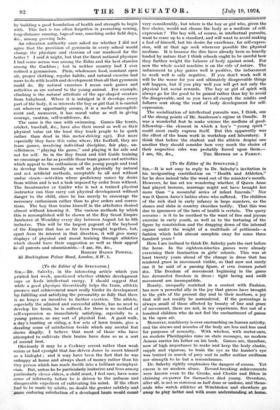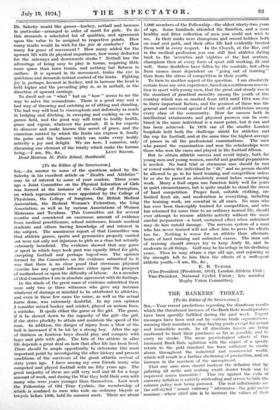[To the Editor of the SPECTATOR.] SIR,—It is not easy
to reply to Dr. Saleeby's invitation in his invigorating contribution on " Health and Athletics," for he does indeed take the word out of the minister's mouth. However, he has set me wondering whether, if Queen Anne had played lacrosse, marriage might not have brought her more than "a mournful series of infant funerals." Nor was it Queen Anne's babies alone who suffered. The children of the rich died in early infancy in large numbers, as the stones and slabs in country churches testify. That this was due to ignorance of the laws of health is certain. The query remains : is it to be ascribed to the want of free and joyous exercise in early youth, as well as to the torturing of the figure by constriction and the dragging down of the internal organs under the weight of a multitude of petticoats—a fashion which held almost complete sway for some three hundred years ?
Here I am inclined to think Dr. Saleeby puts the cart before the horse. In the eighteen-nineties games were already exercising their fascination in girls' schools. This was at least twenty years ahead of the change in dress that has rendered grace in movement visible, so that now not rarely can it be said of a passing figure, et vera incessu patuit dea.. The freedom of movement beginning in the game has demanded freedom in dress : tight lacing and swift movement are incompatible.
Beauty, unequally matched in a contest with Fashion, has now a powerful ally in the joy that games have brought to the girls of the present day and to their mothers, a joy that will not readily be surrendered. If the percentage is always small of those affected by beauty of line and grace of movement, there are not, in my experience, five out of a hundred children who do not feel the enchantment of games in the open air.
Moreover, machinery is ever encroaching on human activity, and the sinews and muscles of the body are less and less used for purposes of necessity. With wireless, with motor-cars, no modern Pheidippides runs on state messages, no modern Aeneas carries his father on his back. Games are, therefore, now of high importance to make and keep the body elastic, supple and vigorous, to train the eye as the hunter's eye was trained in search of prey and to suffer neither swiftness nor strength to be but a remembrance.
Dr. Saleeby rightly emphasizes the dangers of excess. Yet excess is no modern abuse. Record-breaking achievements were known even to the Greeks, and Cleobis and Biton in claiming ox-power for themselves died young. Overdone, after all, is not so common as half done or undone, and thous- ands who watch athletes at Wimbledon and elsewhere go away to play better and with more understanding at home.
Dr. Saleeby would like games—hockey, netball and lacrosse in particular—arranged in order of merit for girls. To do this demands a scheduled list of qualities, and agreement upon the value to be assigned to respective points. How many marks would he wish for the joie de combattre I How many for grace of. movement ? How many added for the upward lift with its physical importance, how many deducted for the sideways and downwards stroke ? Netball has the advantage of being easy to play in towns, requiring little more space than lawn tennis, and nothing but flatness in surface. It is upward in its movement, trains the eye in quickness and demands instant control of the limbs. Fighting joy is, perhaps, keenest in hockey, and in lacrosse the head is held higher and the prevailing play is, as in netball, in the direction of upward carriage.
To dwell not on " what " but on " how " seems to me the way to solve the conundrum. There is a good way and a bad way of throwing and catching as of sitting and standing. The bad way will lead to visceroptosis and deformity as much in hedging and ditching, in sweeping and cooking as on the games field, and the good way will tend to bodily health, grace and vigour, whatever the pursuit. It is for experts to discover and make known this secret of grace, and the conscious control by which the limbs can express it, finally the poise and the balance which can make every bodily activity a joy and delight. We are here, I conceive, only discussing one element of the trinity which make the human







































 Previous page
Previous page